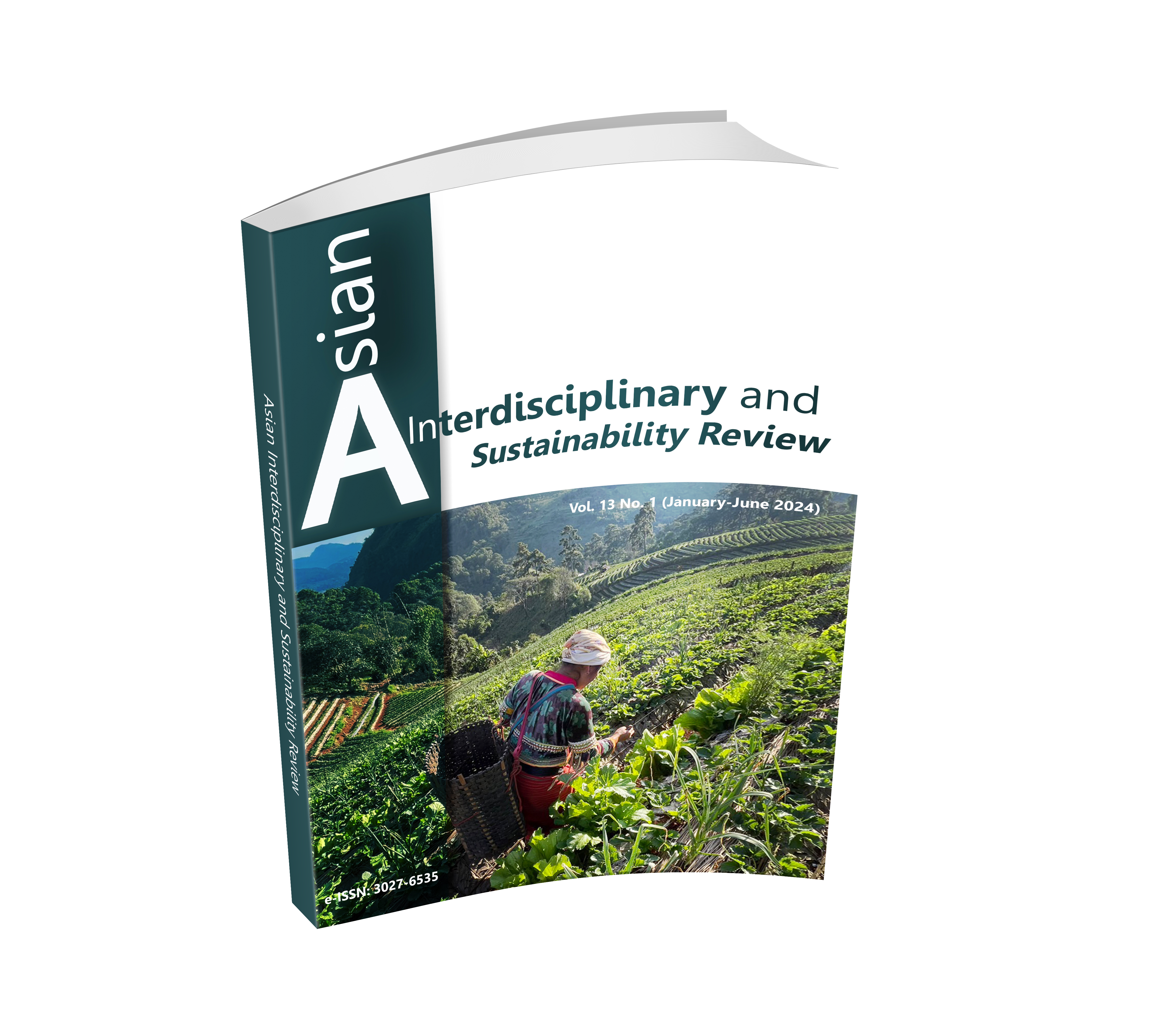DEVELOPING A COURSE MODEL OF YOUTH INNOVATORS UNDER THE PRINCIPLE OF STEAM 4 INNOVATOR TO PROMOTE STABILITY IN THAILAND’S SOUTHERN BORDER AREAS
DOI:
https://doi.org/10.14456/aisr.2024.4Keywords:
STEAM 4 INNOVATOR, Youths, Thailand’s Southern Border, StabilityAbstract
This research aims to study the primary knowledge and skills required to be innovators, develop a course model for youth innovators and assess student satisfaction with the course. The research utilizes participatory action research as a methodology. The conduction process is divided into four stages as follows: 1) studying and analyzing information to improve the course, 2) developing the course draft and having experts assess its quality, 3) trying out the course, and 4) evaluating and adjusting the course. 20 samples were taken from 20 high school students who are representatives from a private Islamic school that teaches both religious and general education together in the Thailand’s southern border areas. The research results reveal as follows: skills evaluation result is suitable at a good level in each item, the idea selection and decision-making skills are suitable at a very good level, business development planning skills are suitable at a very good level, communication and information representation skills are suitable at a very good level, and analyzing and data collection skills are suitable at a good level. Whereas the evaluation results on satisfaction evaluation of the course users found that they are suitable at the most level. While the evaluation results in each item on contents are suitable at a much level, and the application aspect is suitable at a much level.
Downloads
References
Jampong, M., & Prammanee, N. (2017). The Development of Work Creation through STEAM Education Approach on Energy. Eau Heritage Journal Social Science and Humanities, 7(3), 81-92.
Jitwanichkul, S. (2017). Communication process for the development of children and youth in the community. Journal of Journalism, Thammasat University, 10(2), 7-9.
Kim, D., Ko, D., Han, M., & Hong, S. (2014). The Effects of Science Lessons Applying STEAM Education Program on the Creativity and Interest Levels of Elementary Students. Journal of the Korean Association for Science Education, 34(1), 43-54.
Komonmarn, C., Kampangkeaw, N., & Ungleng, S. (2016). The Evaluation of Children and Youth Council Development. Journal of Social Work, 24(1), 105-134.
Kruatong, S., & Leesuksam, N. (2020). The Study of Engineering Design Process Skill Using STEM Education on Electricity of Grade 9 Students. Journal of Education and Human Development Sciences, 4(1), 78-91.
Kwon, E. (2004). A new constructivist learning theory for Web-based design learning with its implementation and interpretation for design education. Doctor of Philosophy Thesis, Ohio State University.
Laboy-Rush, D. (2015). Integrated STEM Education through Project-Based Learning. Retrieved from https://studentsatthecenterhub.org/resource/integrated-stem-education-through-project-based-learning/.
Lesseig, K., Nelson, T., Slavit, D., & Seidel, R. (2016). Supporting Middle School Teachers’ Implementation of STEM Design Challenges. School Science and Mathematics, 116(4), 177-188.
Mayasari, T., Kadarohman, A., Rusdiana, D., & Kaniawati, I. (2016). Exploration of student’s creativity by integrating STEM knowledge into creative products. AIP Conference Proceedings, 1708(1), 080005.
Orapiriyakul, S. (2019). STEAM EDUCATION: Innovative Education Integrated into Learning Management. Journal of Research and Curriculum Development, 9(1), 1-16.
Phengnoi, D., & Boonsom, N. (2021). Development of Scientific Work Creation and Creative Problem-solving Abilities for Fifth Grade Students by STEAM Education-based Learning Activities Management. Silpakorn Educational Research Journal, 13(1), 238-257.
Pongwiritton, R., Chaiwattanaporn, S., Pakvipas, P., & Kantawongwan, B. (2019). Development of the Information System for Business Plan Writing to Propose for the Loan from Financial Institution to Enhance the Capability of Small and Medium Enterprises in Thailand. Panyapiwat Journal, 11(2), 1-16.
Riquelme, H. (2000). How to Develop More Creative Strategic Plans: Results from an Empirical Study. Creativity and Innovation Management, 9(1), 14-20.
Saksriwan, D., & Po Ngern, W. (2020). The Development of Art Activities based on STEAM with the Local Learning Resources to Promote the Creative Works of Third Grade Students. Silpakorn Educational Research Journal, 12(2), 53-70.
Sriboon, S., & Pongen, W. (2019). The Learning Outcomes of STEAM Education based on Problem Based Learning to Developing Mathematical Skills and Process for Seventh Grade Students. Journal of Education Studies, 47(1), 526-543.
Thongsamsri, P., & Chantuk, T. (2016). A Confirmatory Factor Analysis of the Factors that Affect the Success of the Innovation Business Plan Grant Program. Veridian E-Journal, Silpakorn University, 9(2), 1564-1580.
Udom, C., Sachdev, H., Phaiboonrattananon, N., & Butchiwan, P. (2016). Social Key Institutions and the Linkage of Youth Development. Phranakhon Rajabhat Research Journal (Humanities and Social Sciences), 11(2), 227-237.

Downloads
Published
How to Cite
Issue
Section
License
Copyright (c) 2024 Authors

This work is licensed under a Creative Commons Attribution-NonCommercial-NoDerivatives 4.0 International License.











.png)


